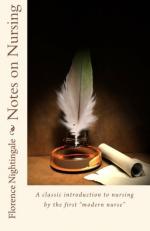[2] It is made a frequent recommendation to persons about to incur great exhaustion, either from the nature of the service, or from their being not in a state fit for it, to eat a piece of bread before they go. I wish the recommenders would themselves try the experiment of substituting a piece of bread for a cup of tea or coffee, or beef-tea, as a refresher. They would find it a very poor comfort. When soldiers have to set out fasting on fatiguing duty, when nurses have to go fasting in to their patients, it is a hot restorative they want, and ought to have, before they go, not a cold bit of bread. And dreadful have been the consequences of neglecting this. If they can take a bit of bread with the hot cup of tea, so much the better, but not instead of it. The fact that there is more nourishment in bread than in almost anything else, has probably induced the mistake. That it is a fatal mistake, there is no doubt. It seems, though very little is known on the subject, that what “assimilates” itself directly, and with the least trouble of digestion with the human body, is the best for the above circumstances. Bread requires two or three processes of assimilation, before it becomes like the human body.
The almost universal testimony of English men and women who have undergone great fatigue, such as riding long journeys without stopping, or sitting up for several nights in succession, is that they could do it best upon an occasional cup of tea—and nothing else.
Let experience, not theory, decide upon this as upon all other things.
[3] In making coffee, it is absolutely necessary to buy it in the berry and grind it at home. Otherwise you may reckon upon its containing a certain amount of chicory, at least. This is not a question of the taste, or of the wholesomeness of chicory. It is that chicory has nothing at all of the properties for which you give coffee. And therefore you may as well not give it.
Again, all laundresses, mistresses of dairy-farms, head nurses, (I speak of the good old sort only—women who unite a good deal of hard manual labour with the head-work necessary for arranging the day’s business, so that none of it shall tread upon the heels of something else,) set great value, I have observed, upon having a high-priced tea. This is called extravagant. But these women are “extravagant” in nothing else. And they are right in this. Real tea-leaf tea alone contains the restorative they want; which is not to be found in sloe-leaf tea.
The mistresses of houses, who cannot even go over their own house once a day, are incapable of judging for these women. For they are incapable themselves, to all appearance, of the spirit of arrangement (no small task) necessary for managing a large ward or dairy.
VIII. BED AND BEDDING.
[Sidenote: Feverishness a symptom of bedding.]




